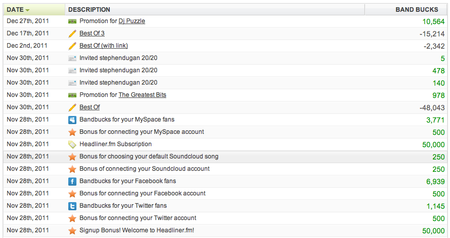
Headliner.fm is a platform for trading recommendations with other artists on Facebook, Twitter, and MySpace. You “buy” recommendations using a virtual currency called band bucks, which can be purchased outright for real money or earned by recommending other artists.
Creating a promotion is deceptively simple. You start by writing the recommendation and adding a link:

I say “deceptively” because I managed to botch my first one, to the tune of 48,043 band bucks. You’re supposed to put your link in the URL box and then click “shorten URL,” which appends a bit.ly link to the message. I wanted people to see where the link went, which makes it more likely to be clicked, so I didn’t shorten it.
My heart sank when I saw that my first recommender’s status update was missing the link. I immediately withdrew the promotion, which only removes it from the pool of promotions artists can accept. I still had to pay for every pending recommendation, even though some were scheduled weeks ahead!

The rest of the options are relatively straightforward. Choose your networks, genres of artists who can recommend you, and any particular artists you’d like to add. To restrict the promotion to a certain city (US only), start typing its name and hope it appears in the drop-down box. You can set the campaign to run for 3, 7, 14 or 30 days.
Surprisingly, you can’t choose how many band bucks to allocate to a promotion, which makes it difficult if not impossible to split test multiple campaigns. Weak!
My Results
I’ve run four promotions over the two months I’ve been using Headliner.fm. The first three are identical (beyond the missing link in the first), hyping a “best of” set I made available for free download through Christmas:
Depeche Mode and Postal Service fans, grab this Color Theory best-of album now, while it’s free! http://bit.ly/ctbohl2
The fourth references a fan favorite from my Depeche Mode tribute album:
Color Theory covers the Depeche Mode classic “But Not Tonight” http://bit.ly/zUbjk8

In total, I reached 111,318 “new fans,” as Headliner.fm optimistically refers to those who could potentially see the status update. Those 111K exposures generated 67 clicks, 8 likes, and 1 comment.
You read that right: out of 122 status updates recommending my music, potentially reaching 111,318 people, exactly one person commented. I would expect dozens if not hundreds of comments, even just “thanks for the link” or “not my cup of tea.” And eight likes - that’s it?
What are these artists’ recommendations worth when their fanbases are so disengaged?
The overall clickthrough ratio of my four promotions was 0.06%. Contrast that with a long-running ad I’ve had on Facebook that’s pretty much identical to my fourth Headliner.fm promotion. It’s averaging a CTR of 0.16% (at $0.16 CPC), and each one of those clicks is a like on my Facebook page!
Based on my results, I don’t think Headliner.fm is worth paying for.
Thankfully, I didn’t have to!

Simply by connecting Headliner.fm to SoundCloud, I got a six month pro account for free. I have yet to receive my monthly 300,000 band buck allowance, but I started out with over 100,000 band bucks! Check out all these bonuses (click to enlarge):
It’s a lucky thing too, because to put it nicely, I’m not finding many artists on Headliner.fm that I can genuinely recommend.
Suggestions
I know I’m coming down hard on Headliner.fm, but I really do love the concept. Here’s what I suggest:
- Measure influence accurately. One small tweak to the formula would account for the all too many artists with artificially inflated like/follower counts: The band bucks an artist receives for a recommendation should be equal to the number of exposures multiplied by the artist’s Klout score, expressed as a percentage. For example, if my Klout score is 50 and I recommend an artist to 10,000 of my fans, I earn 5000 band bucks (10,000 x 0.50).
- Let us cut our losses. If a promotion isn’t delivering the results I hoped for, I should be able to cancel it, effective immediately. Watching my band bucks drain away on that first campaign, due to - let’s face it - a design flaw (accepting a promotion without a link), made a lousy first impression.
- Review every promotion. I’m often asked to post a status update saying “check out my new song” - with a link to someone else’s song. Amateur mistakes litter the requests feed, making it even harder to find acts to recommend.
- Make campaigns flexible. Why limit them to 3, 7, 14, or 30 days? Let me set a daily, weekly, or monthly budget, or set a band buck ceiling. How about “set it and forget it campaigns” that continue running until they’re cancelled?
- Dump MySpace. This one’s a no-brainer. It’s hard to take any MySpace partner seriously in 2012. If you want to include a third social network, make it Google+.
- Tailor updates to individual networks. Nothing screams “spam” like Twitter hashtags on Facebook. On the other hand, a Facebook or Twitter update referencing a big name band (using @bignameband) exposes my promotion to a vastly larger audience. Let us customize our promotions using each network’s API, to maximize our reach.
- Embeddable players. Make a Facebook-embeddable player a la Bandcamp with a prominent “buy” button, that measures plays (partial vs skips), shares, and mailing list signups. People are more likely to listen if they don’t have to click off-site.
Until some of these changes are implemented, or I get my promised 300,000 monthly band buck allowance, I’m done with Headliner.fm.
Have you had better luck? Any other suggestions? Let’s hear about it in the comments!
Brian Hazard is a recording artist with seventeen years of experience promoting his ten Color Theory albums. His Passive Promotion blog emphasizes “set it and forget it” methods of music promotion. Brian is also the head mastering engineer and owner of Resonance Mastering in Huntington Beach, California.
